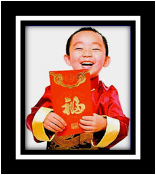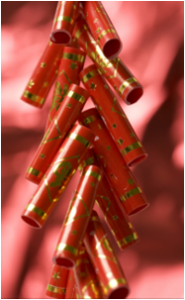Chinese New Year is the most traditional and superstitious festival in the Chinese calendar. The next Chinese New Year starts on 19th February 2015 and will be the Year of the Goat. According to Chinese tradition people born in the Year of the Goat are mild mannered, shy and sympathetic. Personality traits such as creativity, dependability, intelligence, and calmness make them very charming to be with. Whilst they love to be in groups, they do not want to be the centre of attention. Celebrities born in the year of the goat include Kate Hudson, Bill Gates, Mick Jagger, Pixie Lott and Julia Roberts.
Chinese New Year Gifts
Ken comments: “One of my earliest memories was receiving red, money filled envelopes (Hongbao) from family and friends. The Hongbao is the most traditional of all New Year gifts. The Hongbao is also the simplest: an elaborately decorated red envelope filled with scrilla (money).
Use only one or two notes, to keep the value of the envelope hidden and don’t hand out bad luck with anything that includes the number four, the unluckiest of all numbers. Instead stick to ones, fives, and best of all, eights; these are ‘beloved’ numbers.”
Chinese New Year Banquet
Chinese New Year is a social event as families always love to eat together – that is why the Chinese use a round table, so that food and conversation can be shared.
Once you have the family together you can start to prepare your banquet. Key ingredients to include are:
* Chicken for fortune
* Fish for prosperity
* Noodles for longevity (never cut noodles)
* Duck is a symbol of fidelity
* Vegetables represent cleansing of the system
* Wontons represent gold ingots (wealth)
* Seaweed for wealth
Ken says: “Shooting off firecrackers on the eve of Chinese New Year is our way of sending out the old year and welcoming in the New Year; and don’t forget that on the stroke of midnight, every door and window in the house has to be open to allow the old year to go out.”
Chinese New Year is steeped in superstition – here are just some of the other traditions that you could come across:
- The entire house should be cleaned before New Year’s Day. On the eve of Chinese New Year, all brooms, brushes, dusters, dust pans and other cleaning equipment should be put away. Sweeping or dusting should not be done on New Year’s Day for fear that good fortune will be swept away.
- If you cry on New Year’s Day, you will cry all through the year. Therefore, children are tolerated and are not spanked, even though they are mischievous.
- On New Year’s Day, you are not supposed to wash your hair because it would mean you would have washed away good luck for the New Year.
- It is considered unlucky to greet anyone in their bedroom so that is why everyone, even the sick, should get dressed and sit in the living room.
- Do not use knives or scissors on New Year’s Day as this may cut off fortune.
Whilst many Chinese people today may not believe in these dos and don’ts, these traditions and customs are still practiced. Most families say that it is these very traditions, whether believed or not, that provide continuity with the past and provide the family with an identity.
Ken Hom’s range of chilled ready meals are available from Tesco. To download Ken’s booklet to Chinese New Year 2015, please visit www.kenhom.co.uk


